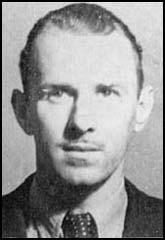Michael Trotobas

Michael Trotobas was born in Brighton. In the 1930s he lived in northern France and on the outbreak of the Second World War Trotobas joined the British Army.
Trotobas was recruited by the Special Operations Executive (SOE). On 6th September 1941, Gerson, along with Victor Gerson, were dropped by parachute into occupied France. After being met by SOE's advance party in Chateauroux he toured France assessing the possibility of organizing subversive networks in the the country.
On his return to London he suggested to the SOE that he should build a network in the Lille area. On 18th November, 1942, Trotobas and Gustave Bieler, were dropped in northern France. Over the next few months Trotobas established the Farmer Network.
In February, 1943, Trotobas and his group achieved its first successful train derailment. Forty trucks were badly damaged and the Lens-Bethune line was closed for two days.
In June 1943, Trotobas went to Paris to make contact with the Prosper Network. While he was there three of its leaders, Andrée Borrel, Francis Suttill and Gilbert Norman were arrested by the Gestapo and he came close to being captured himself.
On 27th June he was back in Lille and leading a group of twenty men he attacked the locomotive works at Fives, one of the largest and most important in France. During the operation four million litres of oil were destroyed and twenty-two transformers damaged and the works were out of action for two months.
In October the Farmer Network caused four derailments in five days. The following month he also successfully sabotaged several factories in Lille. On 28th November, the Gestapo managed to arrest one of the leaders of the group. After being tortured he gave the address where Trotobas was living. That night the flat was raided and during the gun battle that followed Michael Trotobas was killed.
Primary Sources
(1) Maurice Buckmaster, Specially Employed (1952)
Trotobas had lived in northern France before the war and, in 1939-40, as an officer in a British regiment, had
renewed acquaintanceship with some friends in Lille. He volunteered to return there and build up an organization which would depend on long-distance transport lorries for its supplies of arms and explosive. In due time, and in spite of many unexpected difficulties, Michel established himself in a suburb of Lille and contacted the organizers of resistance groups in the region. Although communications were difficult - we had to rely on a Paris group for liaison with Michel- the plan worked and stores got through to the north.
It was very slow and dangerous work. For weeks on end we were without news of his progress, but by the middle of 1943 his organization was complete, and we received a request from him for permission to undertake a series of sabotage operations which culminated in the paralysis of the enormous locomotive shops of Fives-Lille. For three or four hectic months the pace grew rapidly, but it was too hot to last. Michel, surrounded in his flat by men of the German security police, realized that he had no hope of survival, so he determined to sell his life dearly. His death in action, however, did not materially slow down a task which was being pursued with fiery determination. His example was an inspiration in the area. In Lille itself, at Roubaix, Tourcoing, Armentieres, Bailleui, Aire-sur-la-Lys and Calais, to name but a few of the centres of resistance, the programme of sabotage and preparation was pursued vigorously.
(2) M. R. D. Foot, SOE in France (1966)
Olivier and Trotobas last met in Arras on 23 November, when the former understood the latter to say he was about to move house (Olivier was one of the three members of the circuit who normally knew where the organizer lived). Two nights later Trotobas confided to Bieler, who had come to see him overnight at Lille, that Olivier was "too much of a matador" and not really up to his job.
In the small hours of the 28th, this judgment was tragically borne out. The Germans raided Dewispelaere's house at 1 a.m. and arrested both the baker and Olivier who happened to be staying the night there; though by day the agent bristled with threats and revolvers, he was captured without a struggle. His captors were brusque with him, stamping on his bare toes; soon discovered who he was, drove him over to Lille where they arrived at a quarter to four, and beat him up some more, demanding his organizer's address. Olivier fairly promptly pointed out the house he believed Trotobas to have left; and from the street - today renamed Rue du Gapitaine Michel - heard shots exchanged as they raided it at a quarter to seven.
The raiding party came out one man short, and angry; saying their inspector had been killed, and they had only shot in return a ginger-haired girl and a man in GMR uniform. Olivier was shown the bodies, and realised he had killed his organizer.
